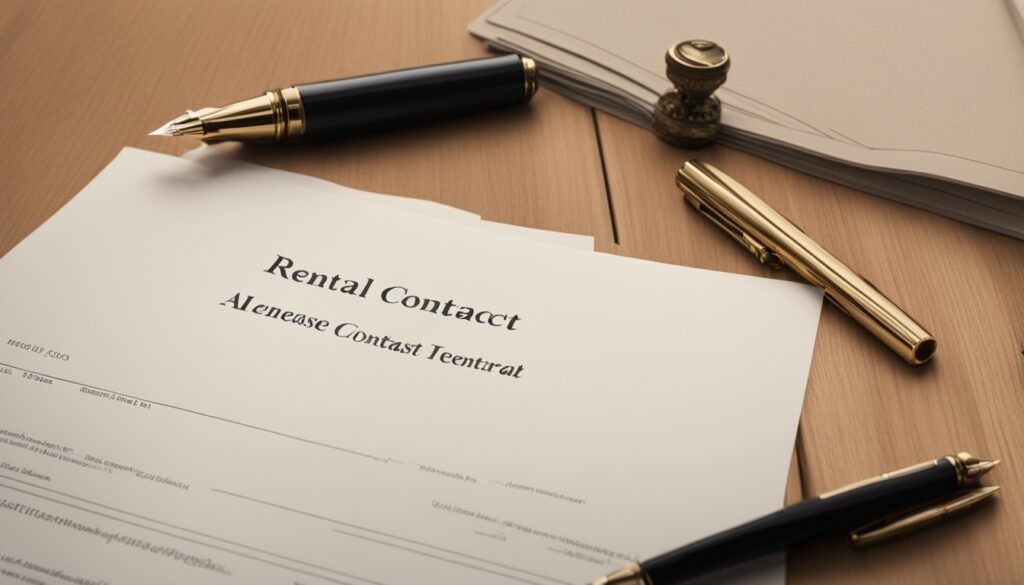Are you thinking about selling your rental property? The housing market and tenant needs change often, making selling a rental property challenging. But, with the right knowledge and planning, you can sell smoothly and get a good return on your investment. This guide will cover the key steps, legal points, and strategies to help you sell your rental property well.
Key Takeaways
- Understand the current housing market trends and how they may impact the sale of your rental property.
- Familiarise yourself with the legal requirements and tenancy agreements when selling a property with tenants in place.
- Evaluate the pros and cons of working with estate agents versus selling the property yourself.
- Prepare your property for viewings by addressing any maintenance issues and presenting it in the best possible light.
- Carefully navigate the sales process, including handling viewings, negotiations, and legal/financial considerations.
Reasons to Sell Your Rental Property
Many landlords are thinking about selling their rental properties as the market changes. This could be because of shifts in the market or personal reasons. Let’s look at some main reasons you might want to sell your rental property.
Changing Market Conditions
The rental market has seen big changes lately. With property values at record highs and mortgage rates going up, the profit from renting out properties might not be as good as before. Some landlords find their rental income is just covering the costs of upkeep. This makes now a good time to sell and use the equity.
Life Circumstances
Your personal life can also affect your decision to sell. You might want to downsize, retire, or spread your investments. If managing tenants or upkeep is hard, selling could be an option. Life events like a new job or moving can also make you consider selling.
There are many reasons to sell a rental property, but think about the financial and personal effects first. Knowing the market and your own situation helps decide if now is the best time to sell your rental.
| Reason | Explanation |
|---|---|
| Changing Market Conditions |
|
| Life Circumstances |
|
 Timing the Sale: When to Put Your Property on the Market
Timing the Sale: When to Put Your Property on the Market
When thinking about when to sell rental property, first look at if your property is rented out. If it is, you still have duties like fixing things and keeping it up until it’s sold. It’s usually best to wait until it’s empty before selling.
Deciding the right time to rental property sale is tricky. You might want to sell when more people want to buy, but you also must follow the law about telling your tenants. Make sure you know your tenancy agreements and local laws to pick the best time to sell.
| Considerations When Timing the Sale | Potential Benefits |
|---|---|
| Waiting until the property is vacant |
|
| Selling during peak market periods |
|
| Aligning the sale with the end of a tenancy |
|
The choice of when to sell rental property depends on your situation, the local market, and your goals. By thinking about these things, you can sell your rental property at the best time. This way, you’ll get the most out of it and avoid any problems.
 Preparing Your Property for Sale
Preparing Your Property for Sale
Selling your rental property requires it to be in top condition. This means fixing any maintenance issues and staging the home well. Doing this can draw in more buyers and possibly get a better sale price.
Addressing Maintenance Issues
Buyers often shy away from properties needing lots of repairs. A study found 44% of buyers might not look at a property with big repair needs. Fixing problems like cracks or loose tiles early can strengthen your negotiating position and avoid price cuts.
Being open about any issues, like subsidence or Japanese knotweed, can prevent surprises later. It’s smart to fix any planning permission or building control issues early to avoid future problems.
Staging and Presentation
Good home staging can greatly improve your rental property’s appeal and value. A clean, uncluttered home sells about 88% faster than a cluttered one. A fresh paint job and new flooring can make the property look better. Upgrading the kitchen and bathrooms can also pay off well.
Don’t forget about the outside of your property. A well-kept exterior can boost its curb appeal. Proper landscaping can add up to 12% to a property’s value. Homes with great kerb appeal sell for about 7% more than those that don’t.
By fixing maintenance issues and staging your rental property well, you can make it more appealing to buyers. This can increase your chances of a successful sale.
| Maintenance Aspect | Impact on Selling |
|---|---|
| Significant maintenance work | 44% of buyers are less likely to consider the property |
| Decluttering and depersonalising | Homes sell 88% faster |
| Fresh paint and new flooring | Enhances visual appeal |
| Kitchen and bathroom upgrades | Up to 70% return on investment |
| Excellent kerb appeal | Homes sell for 7% more on average |
| Proper landscaping | Can increase property value by up to 12% |
Navigating Tenancy Agreements and Notice Periods
When you’re selling your rental property, knowing about your tenants’ agreements and notice periods is key. This knowledge helps with a smooth transition and protects everyone’s rights.
Reviewing Tenancy Agreements
First, review your tenants’ tenancy agreements. You’ll find out about the agreement’s length, the notice needed to end it, and any break clauses. This info is crucial for planning your sale and talking to your tenants.
In England and Wales, you must give at least two months’ notice to take back your property, known as a ‘Section 21’ notice. But, the notice time can change based on the agreement type and how long the tenant has lived there.
- For non-excluded tenancies, you need at least four weeks’ notice.
- For excluded tenancies or licenses, it’s usually one month, the same as the rent period.
- In Scotland, you must give a ‘Notice to Quit’ and a ‘Section 33 notice’, with at least two months’ notice when selling with the property empty.
- In Northern Ireland, the notice time is between four weeks and 12 weeks, based on the tenant’s stay length.
The Renters’ Reform Bill, set to become law in late 2024, will change things. It will make all tenancies periodic from the start and let landlords give a two-month notice at any time during the tenancy.
| Location | Minimum Notice Period for Landlords |
|---|---|
| England and Wales | At least 2 months (Section 21 notice) |
| Scotland | At least 2 months (Notice to Quit and Section 33 notice) |
| Northern Ireland | 4 weeks to 12 weeks, depending on tenant’s length of residency |
Knowing about tenancy agreements and notice periods helps landlords sell a property with tenants inside. It makes the process smoother for everyone.

Selling rented property
When selling a rental property with a tenant, landlords often seek help from local letting agents. These experts know who might be interested – investors or homebuyers – and the property’s true value. They also help with marketing, like taking professional photos and writing a catchy description.
Working with Letting Agents
Working with a trusted letting agent makes selling a rented property easier. They guide you through steps like tenancy agreements and marketing. Their knowledge of the local market and connections can help get a good sale price.
Marketing Strategies
- Use the agent’s skills to write a listing that shows off the property’s best features.
- Make sure photos are top-notch to make the property look great.
- Think about selling through private sales or auctions to attract certain buyers.
- Use the agent’s network and online platforms to find more potential buyers.
Selling a rented property can be tricky, but with the right help and plan, landlords can make a profit. By working with a good letting agent and using smart marketing, you can increase your chances of a successful sale.
| Statistic | Value |
|---|---|
| Minimum notice period for landlords seeking possession | 2 months |
| Reasons for landlords to seek possession under section 8 | Moving back into the property, illegal activities by tenants, rent arrears, or a break clause in the contract |
| Minimum notice period for conducting viewings | 24 hours |
| Estimated monthly loss of landlord properties in 2022 | 3,800 |
| Estimated percentage of housing transactions involving buy-to-let property sales in 2023 | 16% |
| Percentage of landlords planning to sell some properties in the next 12 months | 23% |
Handling Viewings and Negotiations
Selling a rental property with tenants can be tricky, especially with viewings and negotiations. As a landlord, you must balance your tenants’ right to peace with showing the property to buyers. This balance is key.
Conducting Viewings with Tenants
When selling with tenants, give them at least 24 hours’ notice before a viewing. They can say no if the time doesn’t work for them. Finding a time that suits both tenants and buyers can be hard.
To ease the process, keep the property clean and tidy. Make sure common areas look good. Also, share info on local transport and amenities to highlight the property’s appeal.
Selling a vacant property is easier, with more control over viewings and preparation. But, good tenant relationships can make the sales process smoother.
Negotiating the Sale
When negotiating, think about the market and tenant finances. Rental properties with good yields may command higher prices. But, remember how rent changes affect your profits.
Work with your estate agent to know the market and prices. This helps set a fair price and navigate offers. Keeping a professional stance can lead to a better deal and good landlord-tenant relations.

The sales process for a property with tenants may need extra legal steps. This includes moving the tenant’s deposit and matching the sale date with rent due. A skilled conveyancing solicitor can make the process smooth and legal.
Legal and Financial Considerations
When selling a buy-to-let property in the UK, landlords face many legal and financial rules. It’s vital to have all the right paperwork, like an Energy Performance Certificate and a Leasehold Information Pack if the property is leasehold. Also, remember that you might have to pay capital gains tax on any profit from the sale, which could be a big financial hit.
Capital Gains Tax
Selling a rental property can lead to capital gains tax. This tax is on the profit you make from the sale. The tax you pay depends on your personal tax rate, how long you owned the property, and any tax reliefs or exemptions you can get. It’s a good idea to talk to a tax expert to understand the legal and tax sides of selling your rental property.
- Rental income is taxed through income tax, Stamp Duty Land Tax, and Capital Gains Tax, making managing your finances harder for property owners.
- The tax effects of selling a rental property can be big; getting advice from a tax expert is wise before you decide to sell.
| Upfront Costs for Landlords | Typical Letting Agent Fees | Legislation Landlords Must Comply With |
|---|---|---|
| Refurbishments, safety certifications, landlord insurance | 8% to 15% of monthly rent | Around 145 pieces of legislation, covering safety standards and tenant rights |
Knowing the legal and financial sides of selling a rental property helps landlords make smart choices. It ensures they protect their interests and make the sale smooth. Getting expert advice can help landlords deal with the complex issues and get the most from their property sale.
Conclusion
Selling a rental property as a landlord involves many steps and legal rules. You need to understand tenancy agreements, notice periods, and how to handle maintenance. Working with experts can help you get the best value for your property and make the sale smooth.
Deciding to sell might be due to market changes or personal reasons. It’s key to sell at the right time and prepare well. Talk to your tenants, check rental rates, and fix any maintenance issues. Knowing about taxes and legal stuff, like capital gains tax, can also help you.
This article has given you a detailed guide on selling a rental property. Follow these tips to sell with confidence. This way, you and your tenants will both come out well.




